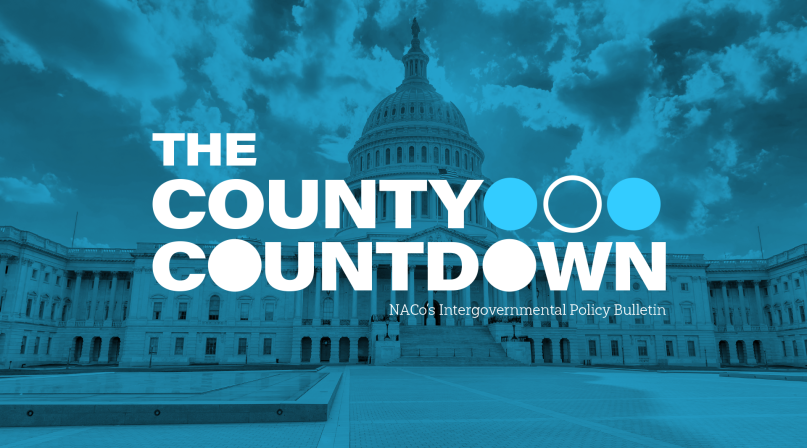County Countdown – March 19, 2024
Upcoming Events
Related News

Every other week, NACo’s County Countdown reviews top federal policy advocacy items with an eye towards counties and the intergovernmental partnership.
Watch the video above and explore NACo resources below.
1. Government Funding Success
Congress passed a fiscal year 2024 minibus appropriations package, including key county priorities.
- PILT program funding: A victory for counties, ensuring $515 million for the PILT Program.
- Mental health and broadband: Gains for mental health and rural broadband with provisions for IMD waiver expansion and the ReConnect Program.
- Upcoming deadlines: The pressure is on with a March 22 deadline to finalize the rest of 2024's federal spending.
2. FCC's Intergovernmental Advisory Update
FCC Chairwoman Rosenworcel appoints county-recommended leaders to the Intergovernmental Advisory Committee.
- New appointments: Four county leaders begin a two-year term advising on broadband services and deployment.
- Get all of the details here.
3. BIL Funding Analysis for Counties
NACo recently released a new report examining the investments made at the county level from the Bipartisan Infrastructure Law, also known as BIL.
- Report findings: As of November 2023, more than $127 billion in transportation funding has been awarded, including $50 billion in discretionary awards; however, only a fraction of these funds are direct investments in counties.
- Call for equity: A more equitable distribution of infrastructure funding, such as direct and flexible allocations to all counties, parishes and boroughs, is crucial for ensuring the continued performance of our national transportation network.
4. Child Care Funding Rule
The U.S. Department of Health and Human Services released a final rule affecting the Child Care and Development Fund, raising concerns for county-run programs.
- Funding implications: Counties managing CCDF in eight states could face funding challenges under the new rule.
- Area of concern: NACo remains concerned that absent additional federal funding, implementation of the CCDF final rule will require difficult tradeoffs that could impact access to the program.
5. National County Government Month
April celebrates the essential services and achievements of county governments.
- Civic engagement: Utilize NACo's suite of community engagement tools to help tell the county story.
- Get involved: Share your county's success stories and advocate for local priorities.
Resource
The Bipartisan Infrastructure Law: Examining Investments in County Infrastructure

Related News

House Agriculture Committee introduces 2026 Farm Bill
On February 13, House Agriculture Committee Chairman G.T. Thompson (R-Pa.-15) introduced the House version of the 2026 Farm Bill, the Farm, Food, and National Security Act of 2026.

U.S. House members introduce NACo-endorsed, bipartisan BASICS Act to improve transportation programs for local infrastructure
On February 9, Reps. Kristen McDonald Rivet (D-Mich.) and Robert Bresnahan (R-Pa.) introduced the Bridges And Safety Infrastructure for Community Success (BASICS) Act.
Upcoming Events

NACo Policy Insider Webinar Series: Understanding the Federal Landscape for Counties, March 12
Join NACo for a bi-weekly webinar offering an overview of the full federal policy landscape impacting counties.

NACo Policy Insider Webinar Series: Understanding the Federal Landscape for Counties, March 26
Join NACo for a bi-weekly webinar offering an overview of the full federal policy landscape impacting counties.

NACo Policy Insider Webinar Series: Understanding the Federal Landscape for Counties, April 9
Join NACo for a bi-weekly webinar offering an overview of the full federal policy landscape impacting counties.
